Compulsory Medical Examination .. Obstetric Violence Is Not Held Accountable

“Take off your clothes, get onto the bed, and open your legs quickly”.
That was the first situation that terrified Nashwa, a pregnant young woman for the first time, from a sharp-talking female doctor.
The doctor didn’t tell her the procedure or its purpose, but she said only a commanding harsh speech.
Nashwa requested to close the door or the curtain in the room that is open to all, but the doctor refused and told her, “quickly; do you think you are in a clinic?!”
Nashwa is one of 1000 women who gave birth in Egyptian hospitals and participated in a survey that included 18 questions, and we collected its data for two months.
The survey aimed to reveal the respect for women’s privacy, the extent of their exposure to violence during childbirth, and to cover the absence of data that addresses this issue.
Women around the world face unacceptable abuse, which is obstetric violence, according to a recent study published by the World Health Organization last March.
The study, titled “Dignity and Respect in Maternity Care,” revealed that women face violations of their rights.
Foremost among them are privacy rights and the absence of informed consent.
While our survey’s results showed that women are exposed to multiple forms of privacy violation and obstetric violence that occur in all types of hospitals.
Those who gave birth in a government or teaching hospital are the most vulnerable to privacy violations.
7 out of 10 of these women underwent vaginal examination without permission, and 63% were not told the purpose of it.
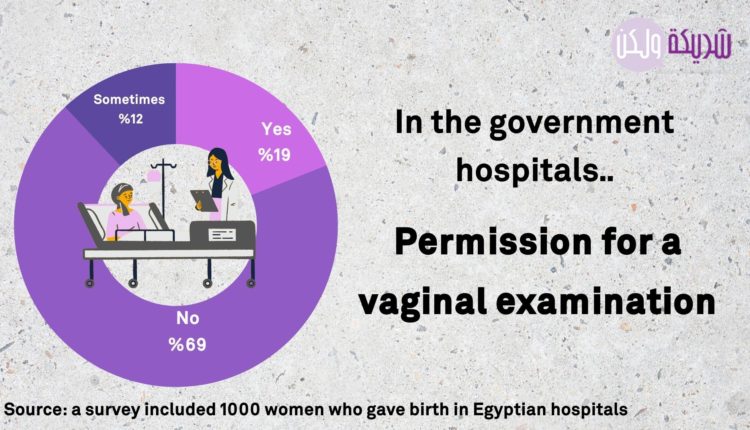
Nashwa… a sharp scalpel and a conscious body
Nashwa was celebrating Eid Al-Fitr in 2021 when childbirth surprised her. She called her doctor, but he refused to suspend his leave for her childbirth.
She went to the teaching hospital in her city in northern Upper Egypt, where the female gynecologist did a vaginal examination, which is a procedure to measure cervical dilation.
The procedure was performed in front of several people and at the sight of a security man, and everyone who passes near a room whose doors are opened.
Nashwa was submitted to the hospital in preparation for childbirth. They repeated the examination in the absence of a coverslip and several people attended it, including students who performed it successively without her consent.
Likewise, half of the women participating in the survey, who gave birth in a government or teaching hospital, were subjected to a vaginal examination by five or more persons.
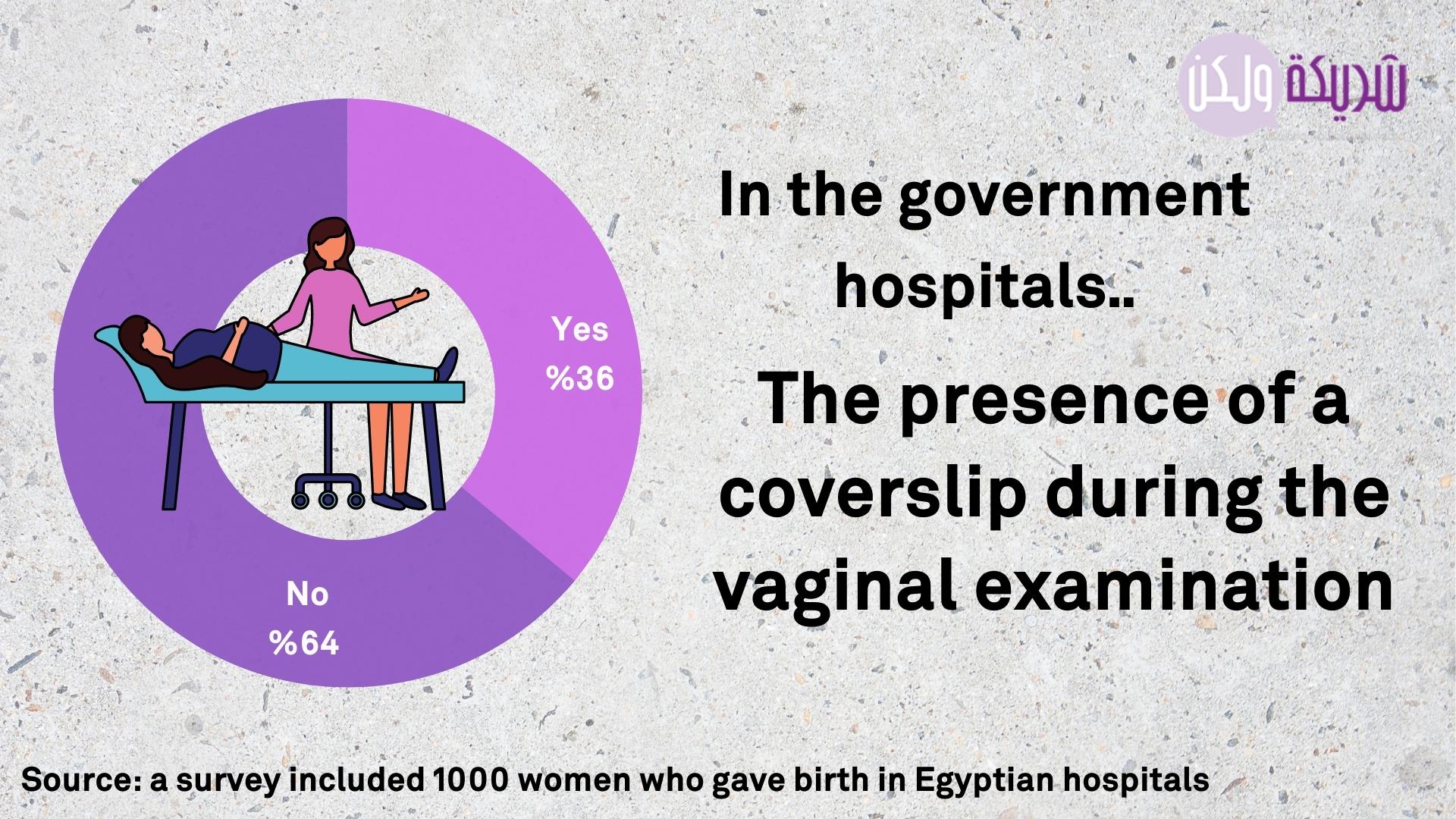
Nashwa said, in an interview with “Sharika Walaken”, “I was subjected to examination more than nine times, not for the purpose of monitoring the condition, but they examined me one by one at the same time.”
And when she refused the examination, they put pressure on her and forced her to undergo it under the pretext that she had no right to refuse because she was giving birth in a government hospital.
6% of women who gave birth in a government hospital refused to undergo a repeated vaginal examination or from multiple persons, and the medical team responded to half of them.
As for the other half, like Nashwa, they suffered from pressure, or were forced to undergo it.
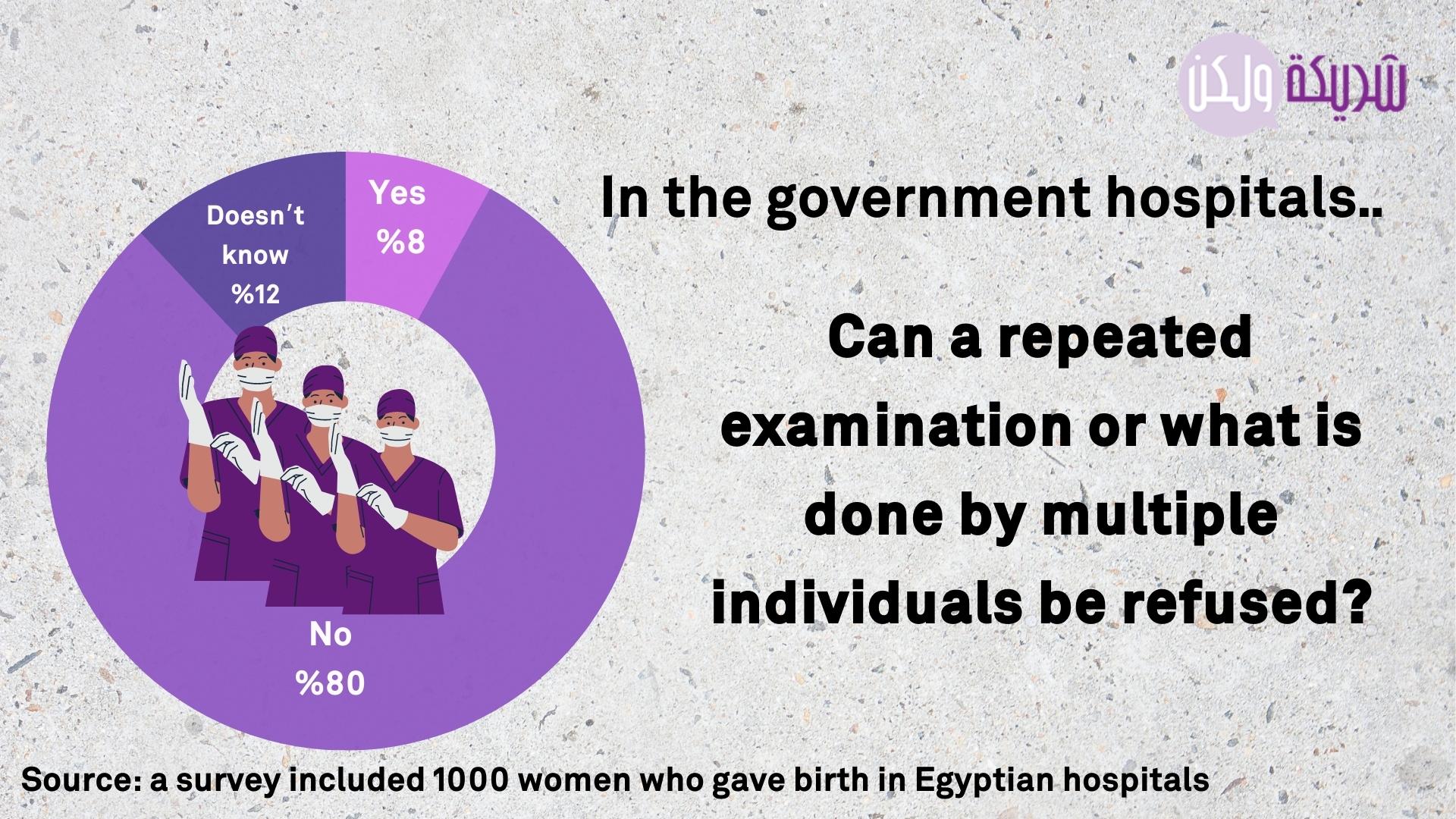
Denial of pain relievers
Nashwa was left in her urgent hospital, suffering from excruciating pain, and the female doctor refused to give her anything to reduce the pain.
She offered to buy the syringe known to relieve the pain of natural childbirth (the epidural, the anesthetic back needle) at her expense. The doctor laughed and said sarcastically: “You are in a government hospital.”
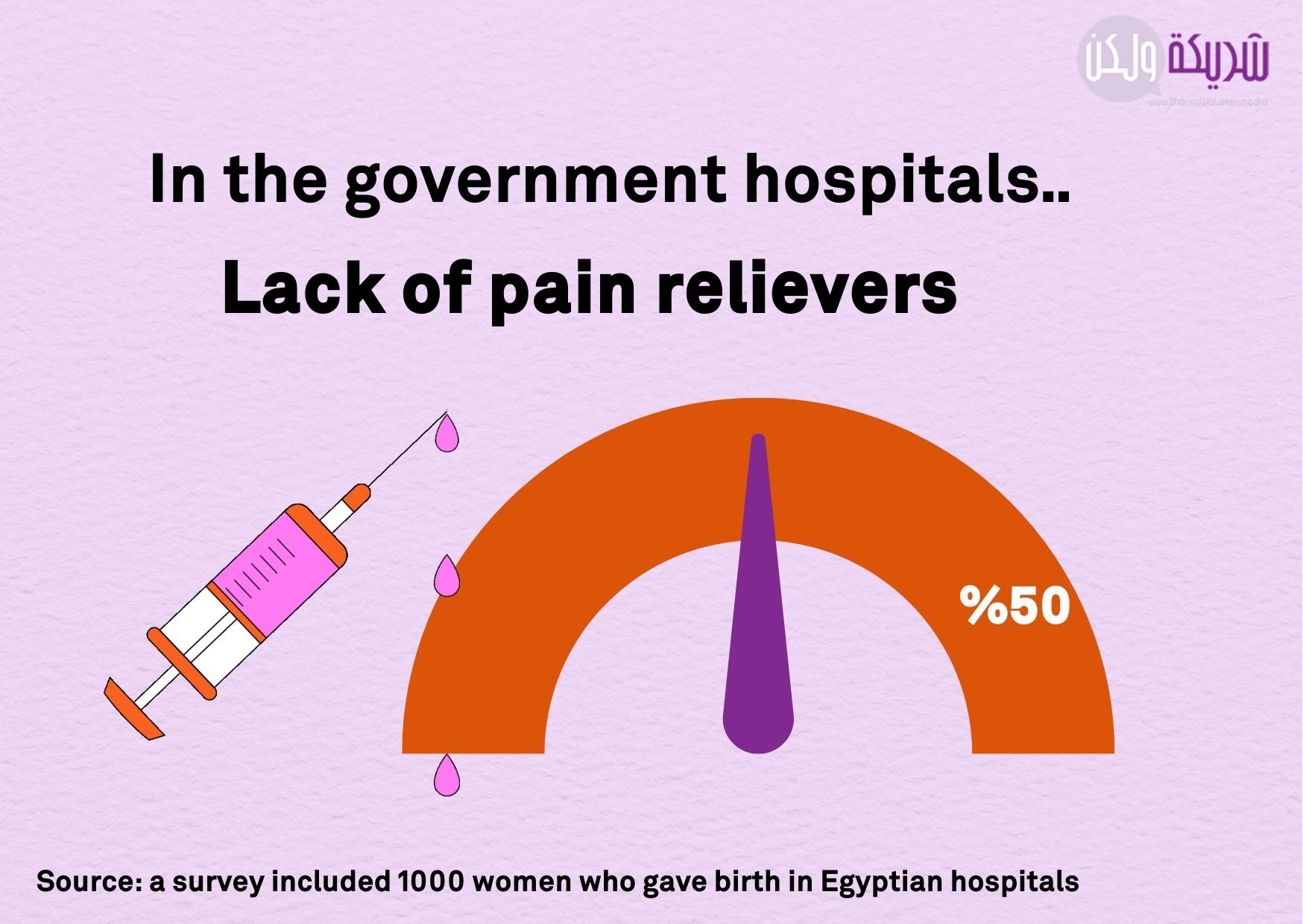
“I had to endure humiliation and abuse because I needed them. While I was in pain of labor, I was subjected to verbal violence, ridicule and disregard for my pain.”
She added, “they ordered me to walk to the operations room without any help, and when I expressed my pain, the female doctor shouted at me and scolded me again.”
Inside the operation room, she had an episiotomy.
It is an incision between the opening of the vagina and the anus to facilitate the exit of the newborn, which is needed by some women.
But it is done routinely and sometimes unnecessarily, and Nashwa underwent it, without an explanation of its purpose or her consent, and without using anesthetic or painkillers.
When she screamed as the sharp scalpel passed through her conscious body, the doctor cursed her and accused her of pretending to be in pain.
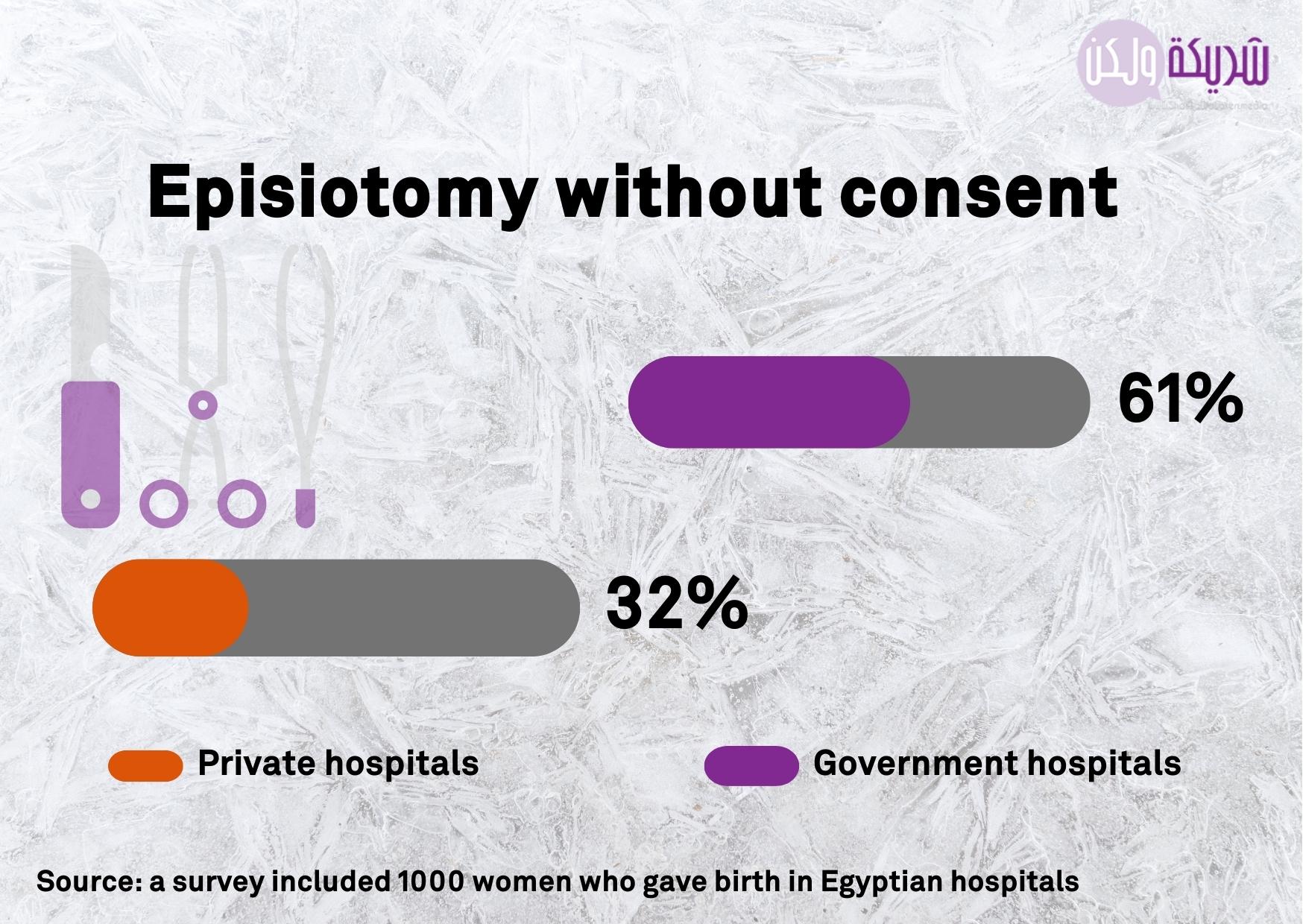
Nashwa’s journey of torment did not end after giving birth, the doctor brought a needle and thread to repair what she did.
She asked her again to use a local anesthetic to relieve her pain, the female doctor refused, saying, “I have one hour left on my shift, and I will not go get a materials again.”
After the doctor finished stitching, she ordered her, saying, “get up and get out.”
Today, Nashwa is still suffering from psychological complications, which have not left her, and physical pain due to the severe narrowing of the vagina, although more than a year has passed since her childbirth.
Narrowing of the vagina is a procedure that is done to satisfy the husband or partner, and she was also subjected to it without explanation or consent.
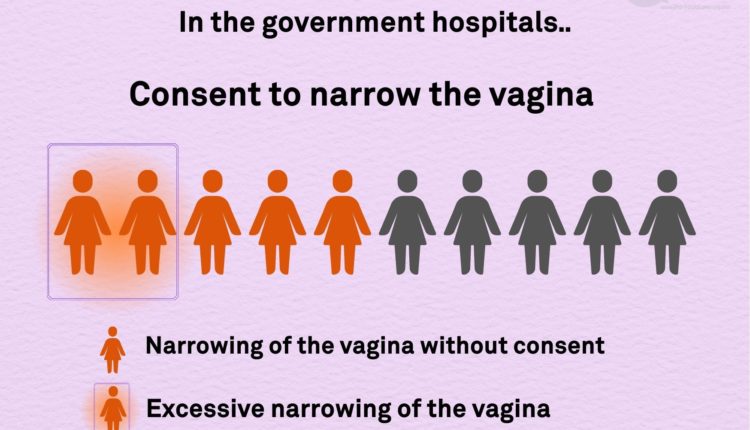
Obstetric violence… gender-based violence
Cairo Foundation for Development and Law, an Egyptian non-governmental organization with a feminist orientation, works on a program to document and combat obstetric violence as a form of gender-based violence.
In an interview with “Sharika Walaken”, Intisar Al-Saeed, the chair of the Board of Trustees of the Foundation, said that they “document that women face a long list of forms of obstetric violence”.
The most prominent forms in the government hospitals are privacy violations, not using pain-reducing methods, and psychological, verbal and physical violence.
In private hospitals, unnecessary cesarean sections are one of the most common forms of violence.
She added, “Although women can later file a complaint, they face societal stigma, and the difficulty of proving the occurrence of the violation, which is usually done without evidence or witnesses, and thus passes without accountability.”
The results of a study entitled “Cesarean section deliveries in Egypt: trends, practices, perceptions, and costs” conducted by the World Health Organization, Population Council, and Egyptian Ministry of Health showed lack of resources in government and university hospitals and the need for larger supplies of pain relief medications, which can be used during normal childbirth.
And solve the problem of the lack of anesthesiologists necessary to monitor the process of pain relief throughout the vaginal childbirth’s duration, which may extend for long hours, and provide medicines to stimulate labor.
Marion Sims… unprofessional and unethical experiences
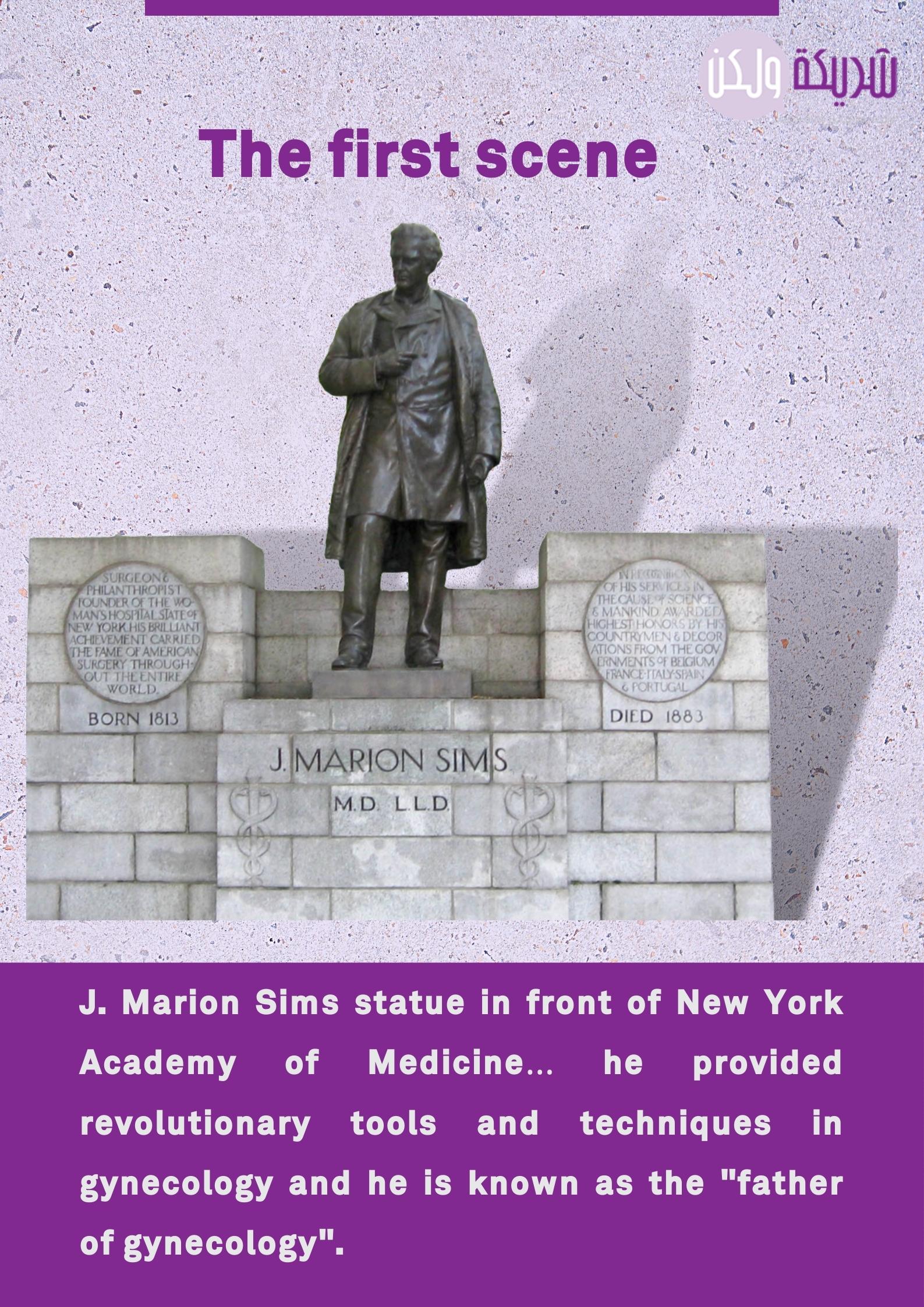
In the 19th century, gynecological medicine witnessed major developments and breakthroughs through unprecedented techniques and treatments.
But it also witnessed a lack of respect for women’s privacy, lack of their permission to take actions related to their bodies, lack of interest in relieving their pain, and their pain being underestimated.
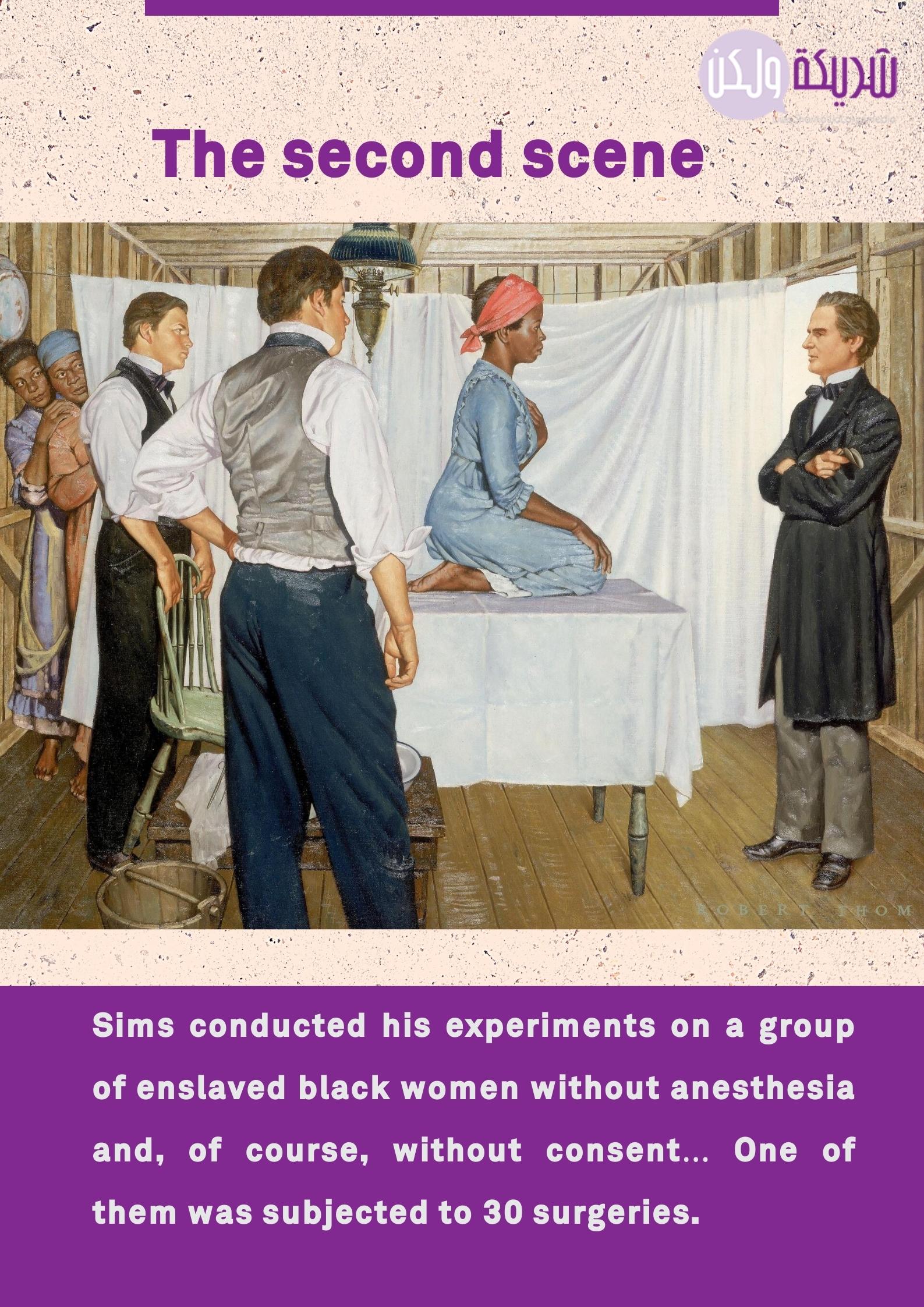
This is what was documented in Marion Sims experiments, the pioneer of gynecology in the United States of America, that were unethical and unprofessional.
Aya… labor without a doctor
Aya doesn’t know what Nashwa went through in the teaching hospital, but she decided to avoid any government hospital for fear of violating her privacy, not getting good care, leaving her in pain without help, or being mistreated, as others who have experienced it warned her.
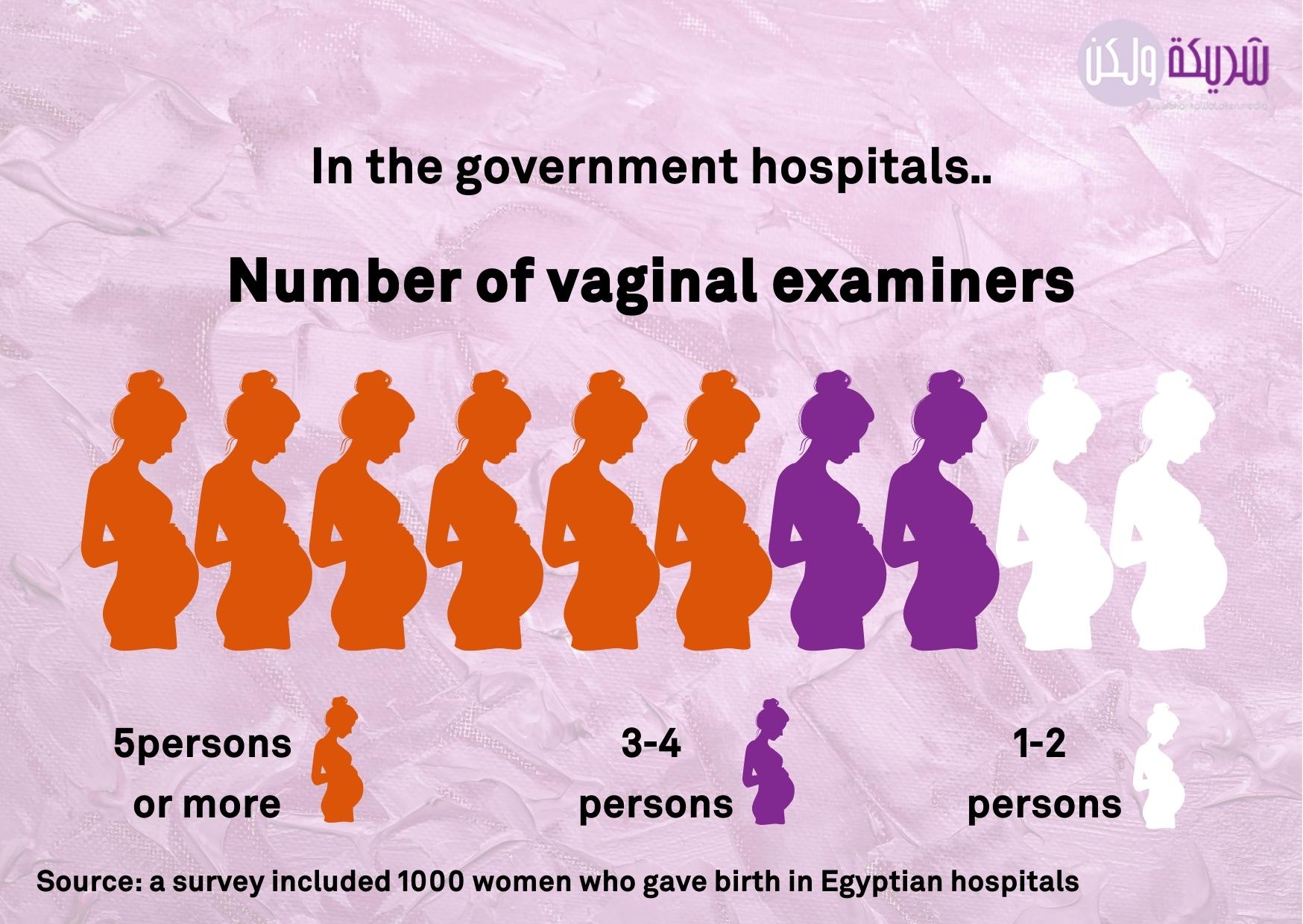
Many women share Aya’s concerns, so they are keen to receive care through the private sector.
According to the “Cesarean section deliveries in Egypt” study, women think that doctors in private sector are more experienced, have modern equipment, provide more information, and they are more interested in their fears and concerns during childbirth, and because the doctor who follows up on the pregnancy is the same one who performs the childbirth.
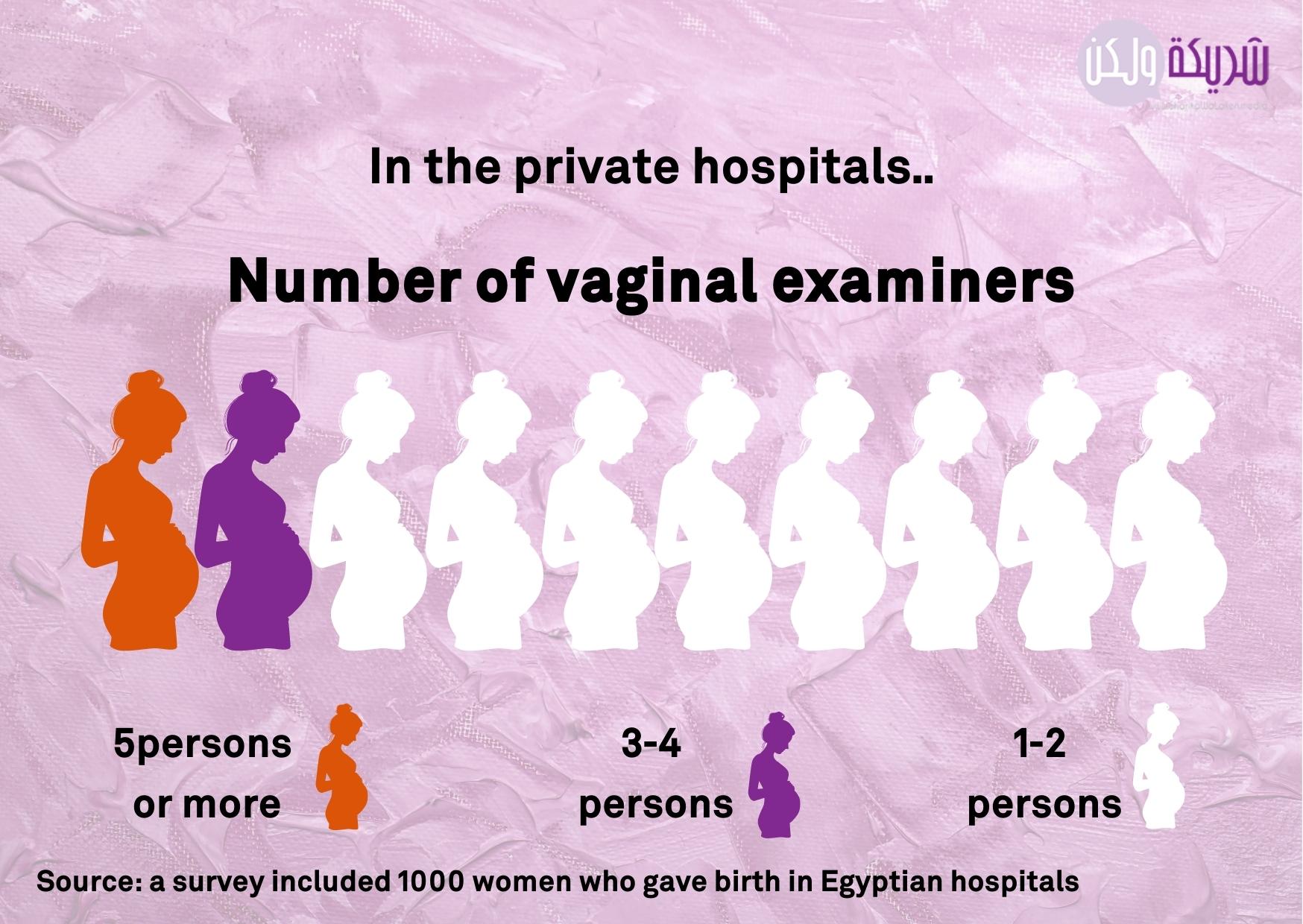
Aya moved to her family’s house in a village in Sharkia Governorate, northern Egypt, to give birth to her first child, and to share with them the joy of the expected first grandchild.
She called her doctor after three days of the onset of labor’s signs and told him that she was having a baby, but he insisted that she is giving birth for the first time, and she has more time.
Aya told “Sharika Walaken”, that when she “insisted that she was giving birth and needed follow-up, even for an additional fee, he asked her to go to the clinic and wait for him.”
The building’s security guard brought her and her mother into the clinic at 10 am, and locked the door from the outside, according to the doctor’s instructions. She waited for him for more than 3 hours, which was “the longest in her life,” as she said.
She was screaming for help, after her baby’s head appeared, but there was no doctor or nurse around to help. As for the doors, they were locked, and the guard wasn’t present.
The labor stopped, the fetal head retracted, and Aya lost consciousness. And when she regained consciousness, the doctor came and started injecting her with substances that she later knew were labor induction, so that she could go back into labor, according to what she told us.
But things had gone wrong, and he made, without explanation or consent, a large incision in the perineum, which later required 14 surgical stitches. The baby finally came out, but it was blue in color, not crying or screaming.
Aya explained that, “after attempts to resuscitate him, he cried, so the doctor said in a hurry: “Thank God for your safety, go rest at home, it is enough that I got out of my house on Friday.”
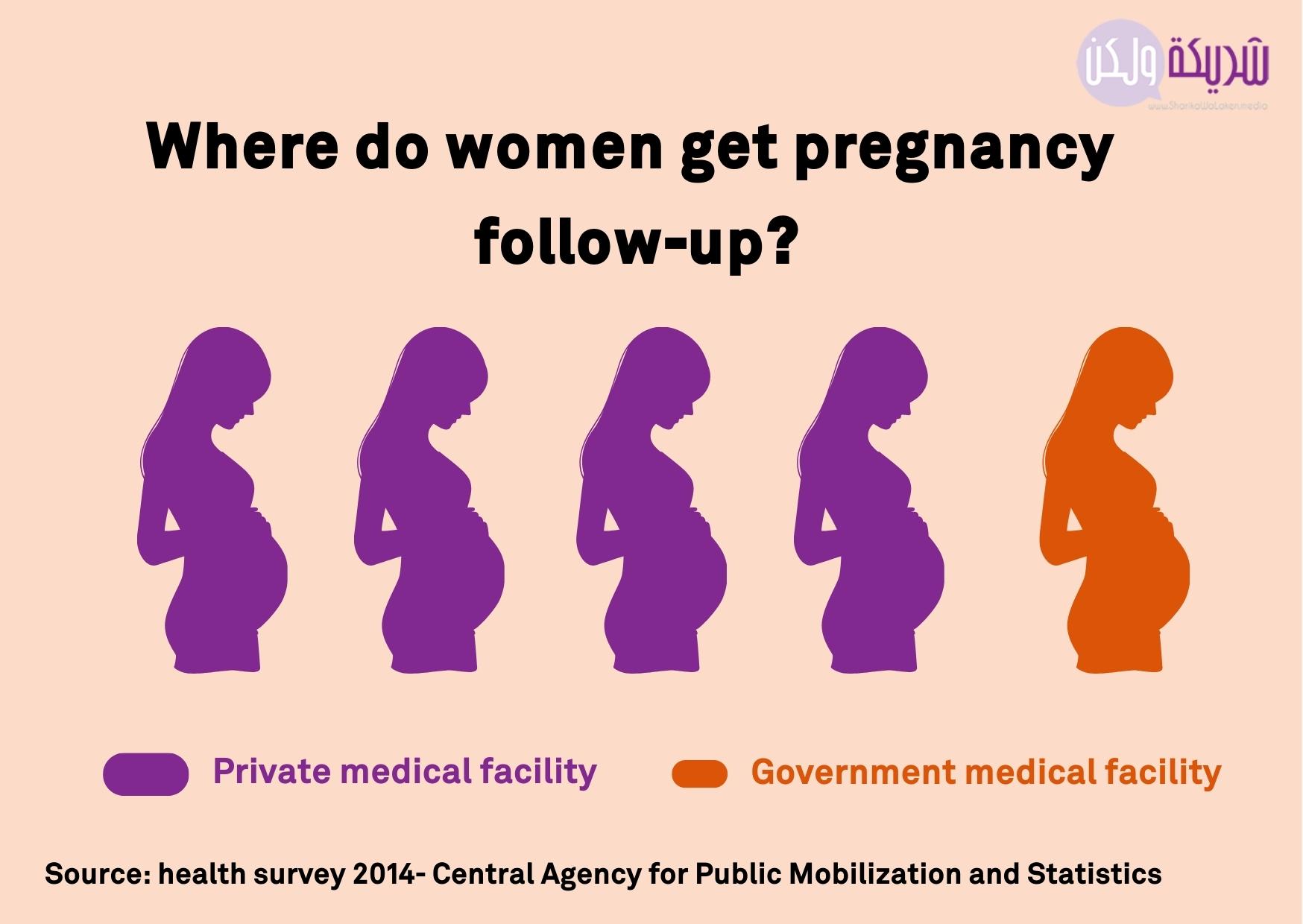
Then the newborn suffered complications that required him to be placed on a ventilator, while she suffered psychological pain because of her difficult experience and the illness of her newborn, and other physical pain because of the large wound that prevented her from sitting or resting, as she confirmed in her interview with our platform.
She added, “The baby died after 5 days, and I began another suffering in which the loss of my child was accompanied by my feelings of guilt, boosted by the blame of some of those around me and accusing me of causing his death, because I failed to give birth at the right time.”
Silence and crying were Aya’s reality for the months after her baby died, and she was diagnosed with depression and post-traumatic stress disorder.
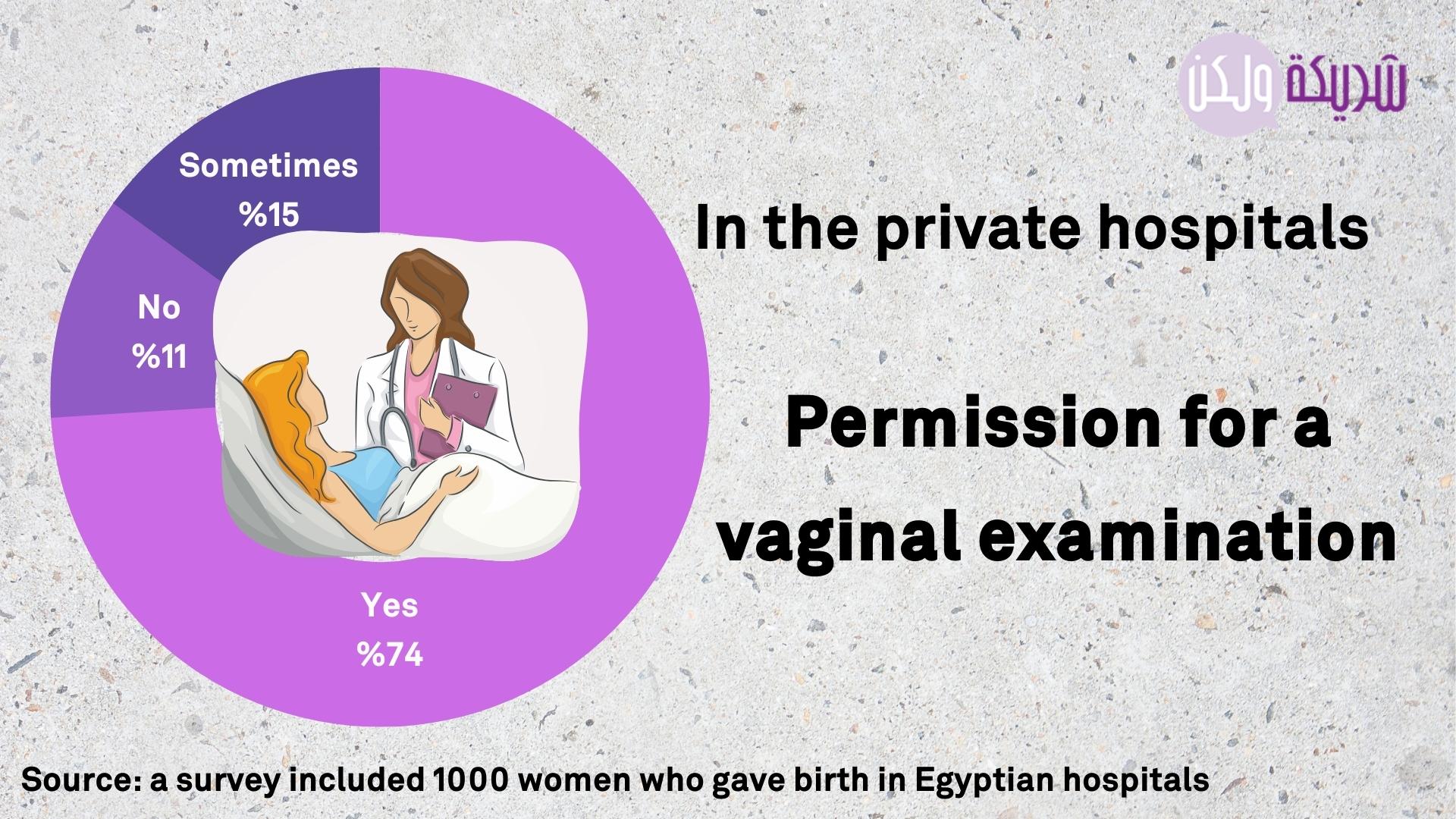
The impact of obstetric violence on women’s mental health
Dubravka Simonovic, the UN special rapporteur on violence against women, confirmed, in a report about obstetric violence, that “it is widespread and systematic, and occurs all over the world, and women are exposed to it on all economic and social levels.”
She explained, “an episiotomy is useful when there is a medical necessity, but if it is performed unnecessarily and without informed consent, it may have negative physical and psychological effects.”
She added, “these effects may reach the level of torture, inhuman and degrading treatment. And suturing of the vagina after childbirth, when it is performed without consent and anesthesia.”
Nehal Zain, Egyptian psychiatrist, told “Sharika Walaken”, “The exposure of women to verbal, physical, or psychological obstetric violence, such as neglect, lack of interest in using means to reduce pain, and violation of privacy, represent painful experiences. These may affect their psychological well-being and cause symptoms and psychological disorders such as depression, anxiety disorder, and post-traumatic stress disorder.”
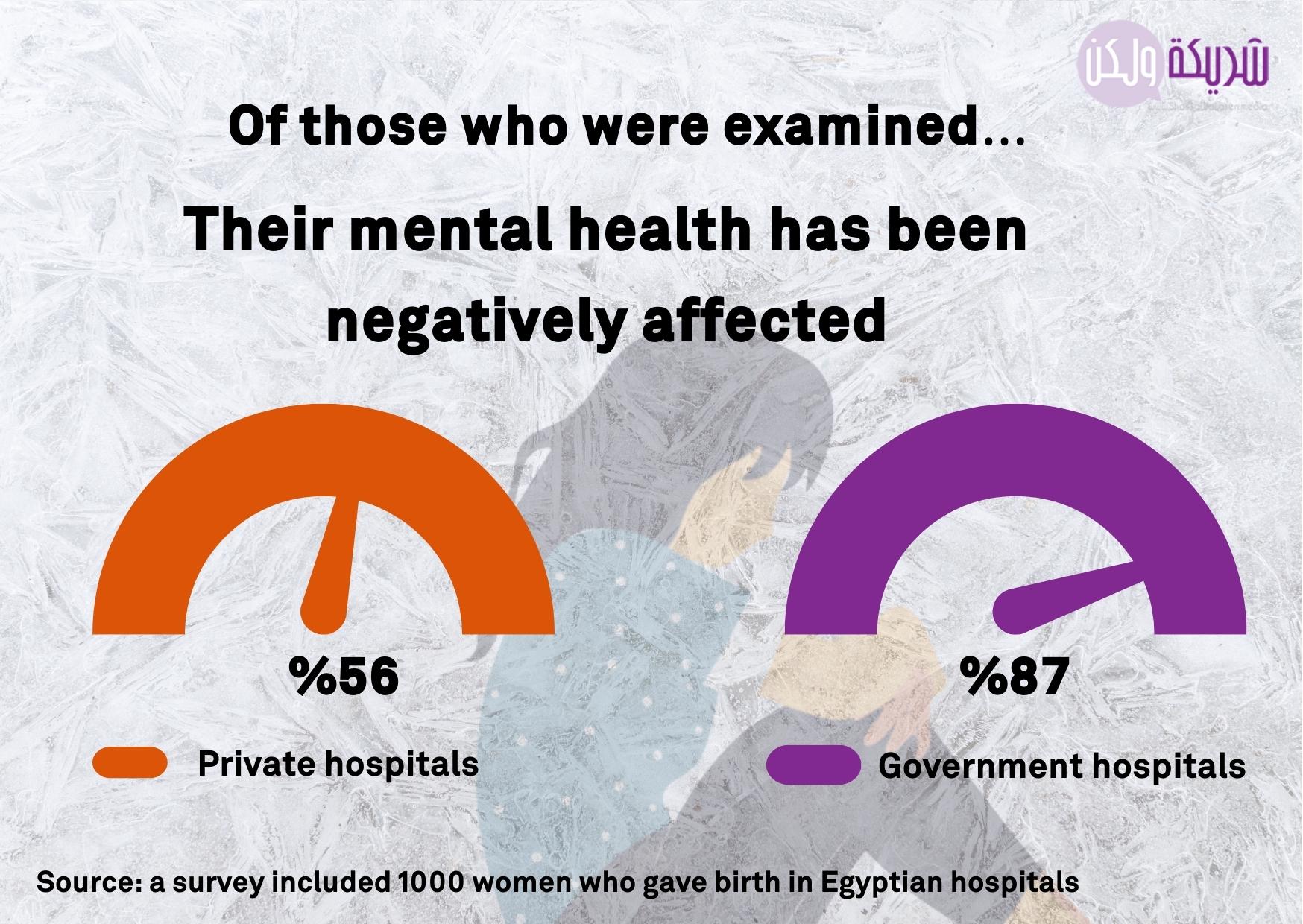
She added, “some women, who have gone through traumatic experiences, have been subjected to pressure from those around them, and disbelief in their feelings and fears. Consequently, the lack of support and appreciation for what they went through represents additional violence and increases the risk of affecting their psychological well-being.”
As for Aya, who later had 3 children, she confirmed that she “does not forget her first horrific loss. And she became more anxious and terrified.”
She added that she visits dozens of male and female doctors and private hospitals to choose the best. There are no government hospitals, no clinics, and no male or female doctors away from the capital, but despite that, her three experiences were not ideal.
Violations, examinations and forced caesarean sections
“I screamed; I thought that the nurse was putting a cover on me but I was surprised when she inserted her hand instead, and the same thing was repeated by others.”
In her second birth, Aya was examined without permission, she was forced to go through labor lying on her back instead of the squatting that she preferred. And this is one of the forms of violence women face during childbirth.
Later, she underwent an episiotomy, then a narrowing of the vagina, without explanation or consent.
Aya felt violated again. She had nightmares constantly and was accompanied by physical and psychological pain due to repeated examinations, the lack of respect for her privacy, and the performing of procedures without her consent.
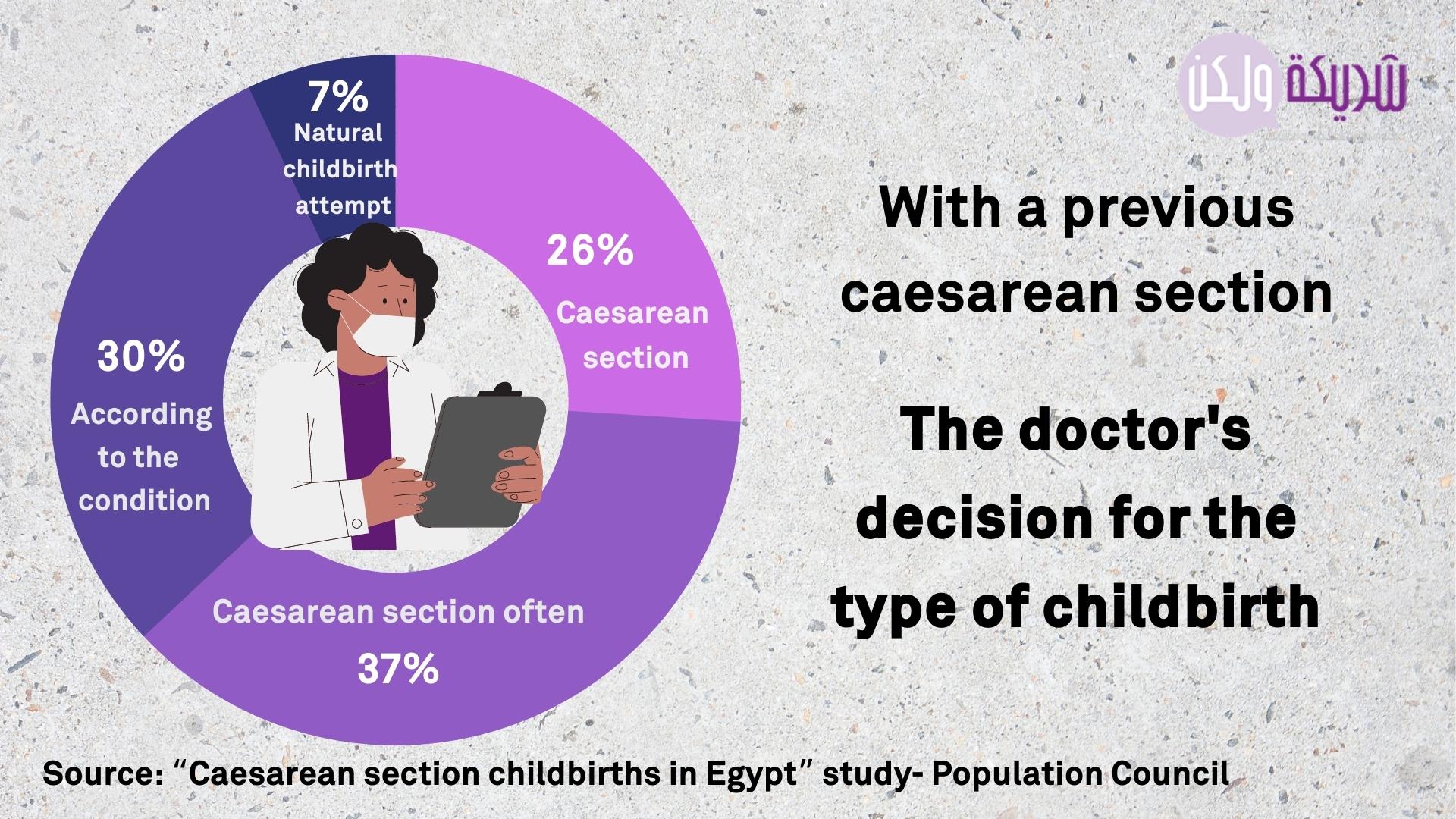
In her interview with our platform, she confirmed that “the vaginal examination is physically and psychologically painful, and it becomes more painful when it happens without permission and you aren’t prepared for it.”
Aya said, “I felt deceived. During my third pregnancy, the doctor did not tell me about my medical condition, or my options for childbirth or procedures during childbirth.”
She was also guided into, and subjected to, cesarean section after having two natural childbirths, and this guidance without medical need is one of the most common forms of violence.
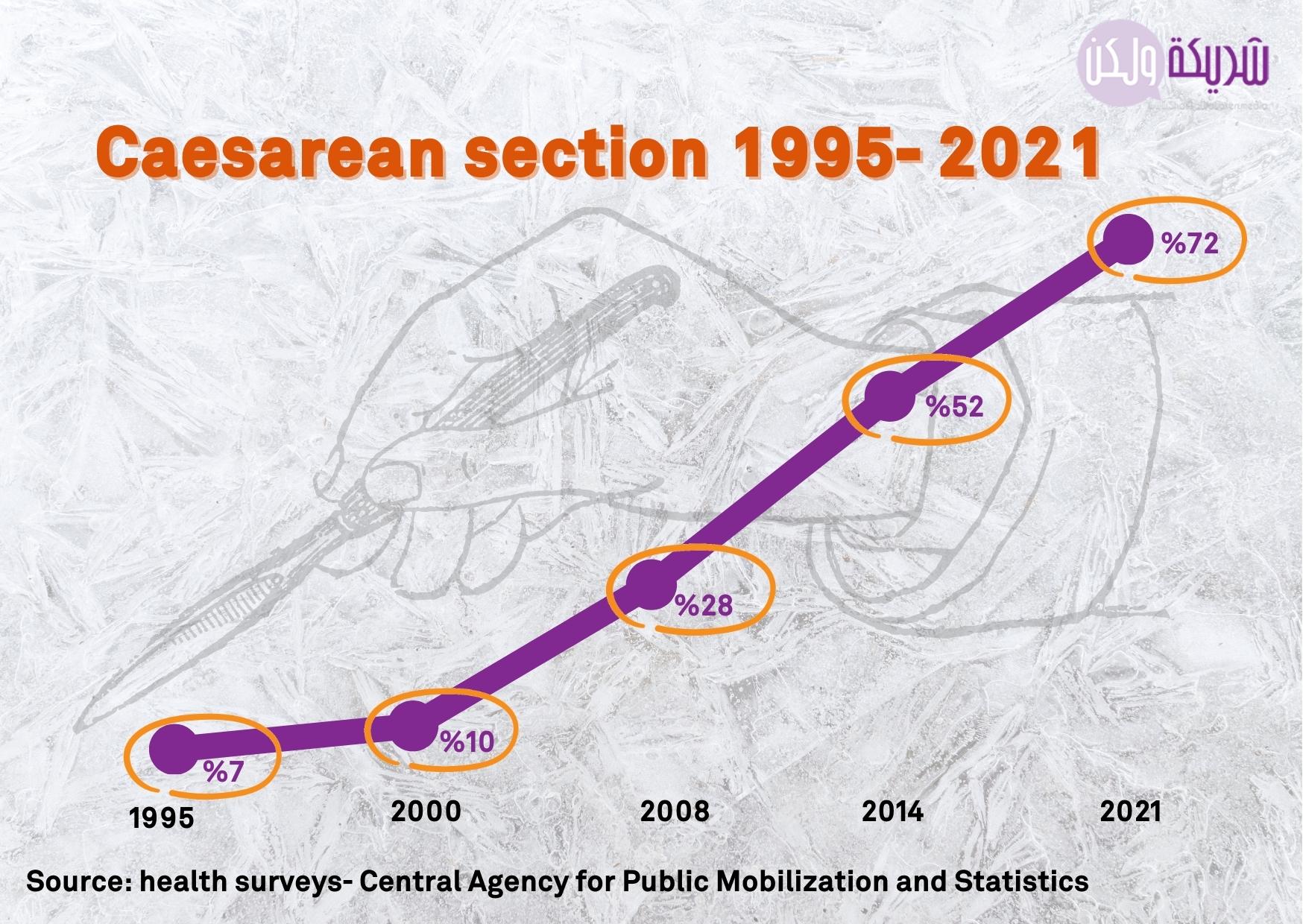
The “Cesarean section deliveries in Egypt” study indicated that, “women may be pushed to cesarean section because of their preference for doctors in the private sector.”
In the private hospital that she chose to give birth to on her fourth pregnancy, Aya confirmed that she was subjected to negative comments and ridicule from people in the medical staff because of her choice to give birth naturally, after her previous cesarean section.
She also underwent multiple unnecessary vaginal examinations by different people. Some were brutally done, to force her to give birth by cesarean section. She was going through active labor pains and her condition was stable, she insisted on having a natural childbirth, and so she did.
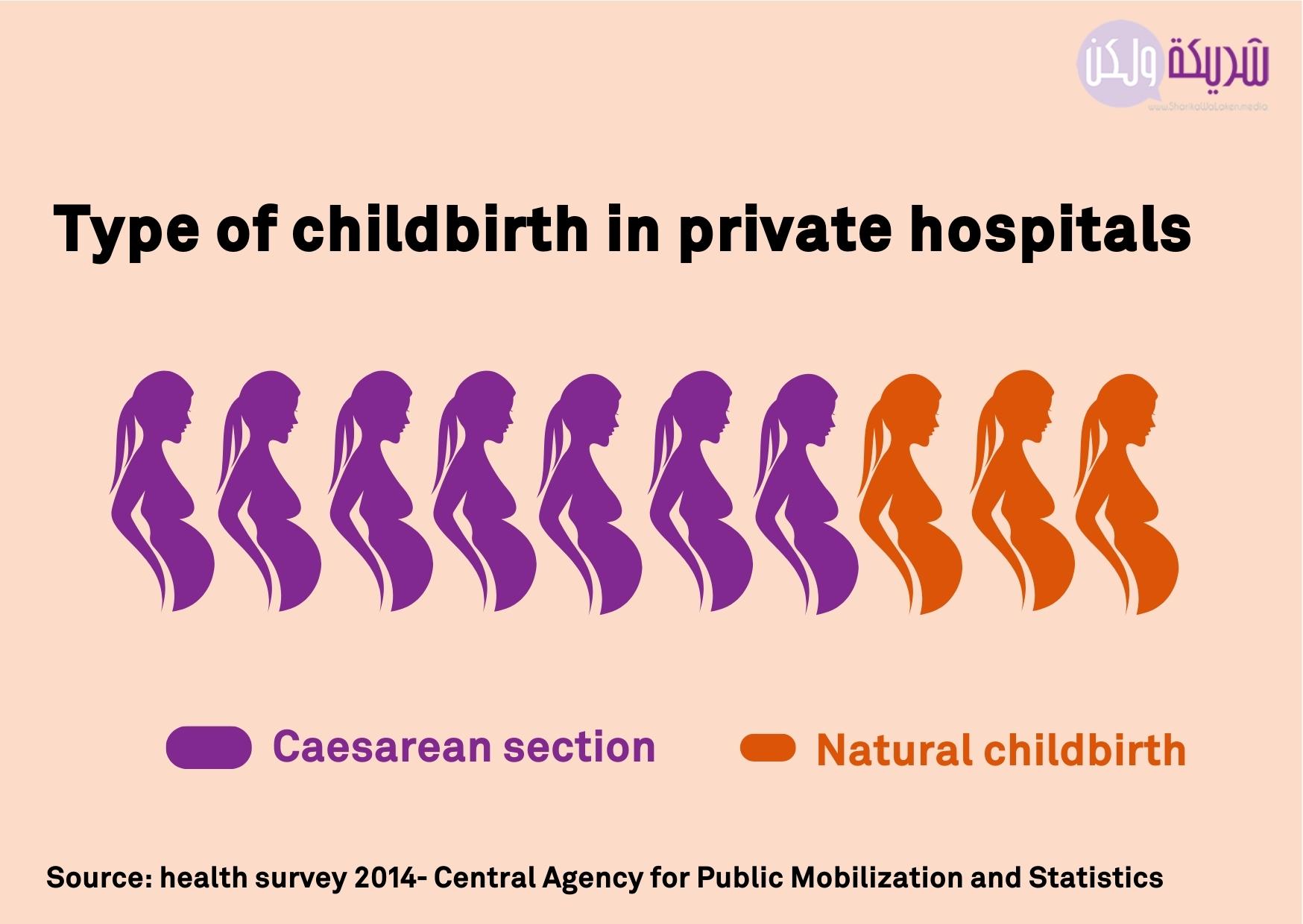
In a related context, Dubravka Simonovic, the UN special rapporteur on violence against women, stated in her report that, “abuse and violence against women during childbirth can threaten their right to life, health and physical integrity, privacy and independence, and to not be discriminated against. And these unethical practices shouldn’t be ignored.”
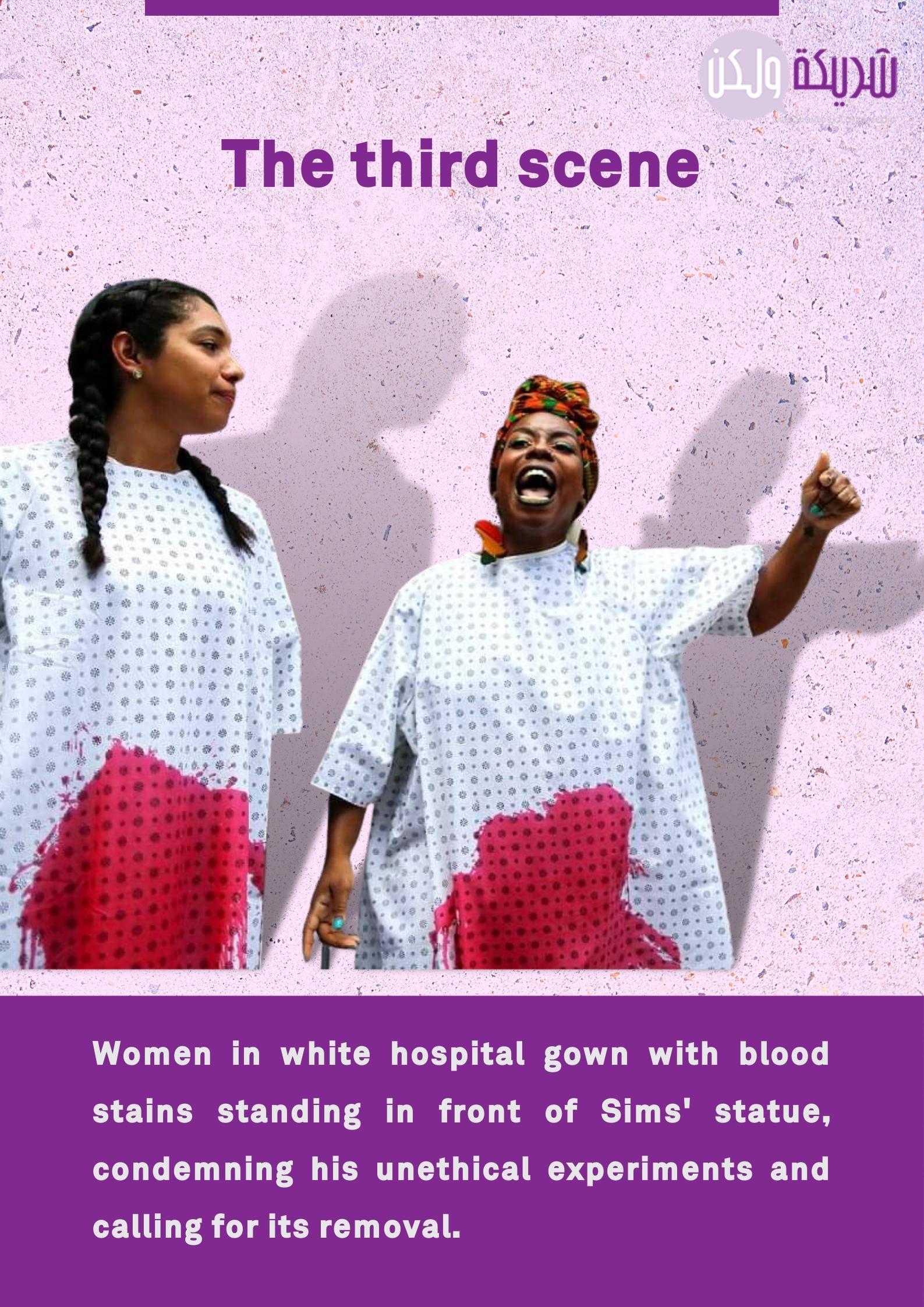
Going through the experience of obstetric violence… Wafaa: I went to Hell!
Intisar Al-Saeed indicated that, “women, in general, are exposed to violence during childbirth; but the poorest and least educated and aware of their rights, and those who deal with the pro-bono departments in government and educational hospitals, are the most likely to face obstetric violence, in its various forms.”
Dubravka Simonovic’s report documented testimonies of women from around the world who were subjected during childbirth to severe humiliation, verbal abuse, gender-biased comments, ridicule, scolding and shouting at them.
Women of lower economic or social status were more humiliated because of their poverty.
Wafaa was trying her best to save the money needed for childbirth with her attending doctor in a private hospital.
But she developed complications during pregnancy, which forced her to give birth prematurely in a government hospital, because the newborn would need incubation for a long time, and she would not be able to afford its bill in a private hospital.
So, she settled on one of the major teaching hospitals in Cairo.
About this experience, she told “Sharika Walaken”, “I went to hell; it was the worst days of my life.”
She added, “I was lying on a dirty bed that was stained with the blood and water of another woman, I was exposed all the time to examination without a coverslip. I was also asked to sit on the bed, and left in the uncovered position, naked, with my legs open until they came back. They examined me dozens of times, and only one of them agreed to cover me.”
This is how Wafaa described her examinations, which continued and was repeated for 12 days, during her stay in the hospital before her childbirth.
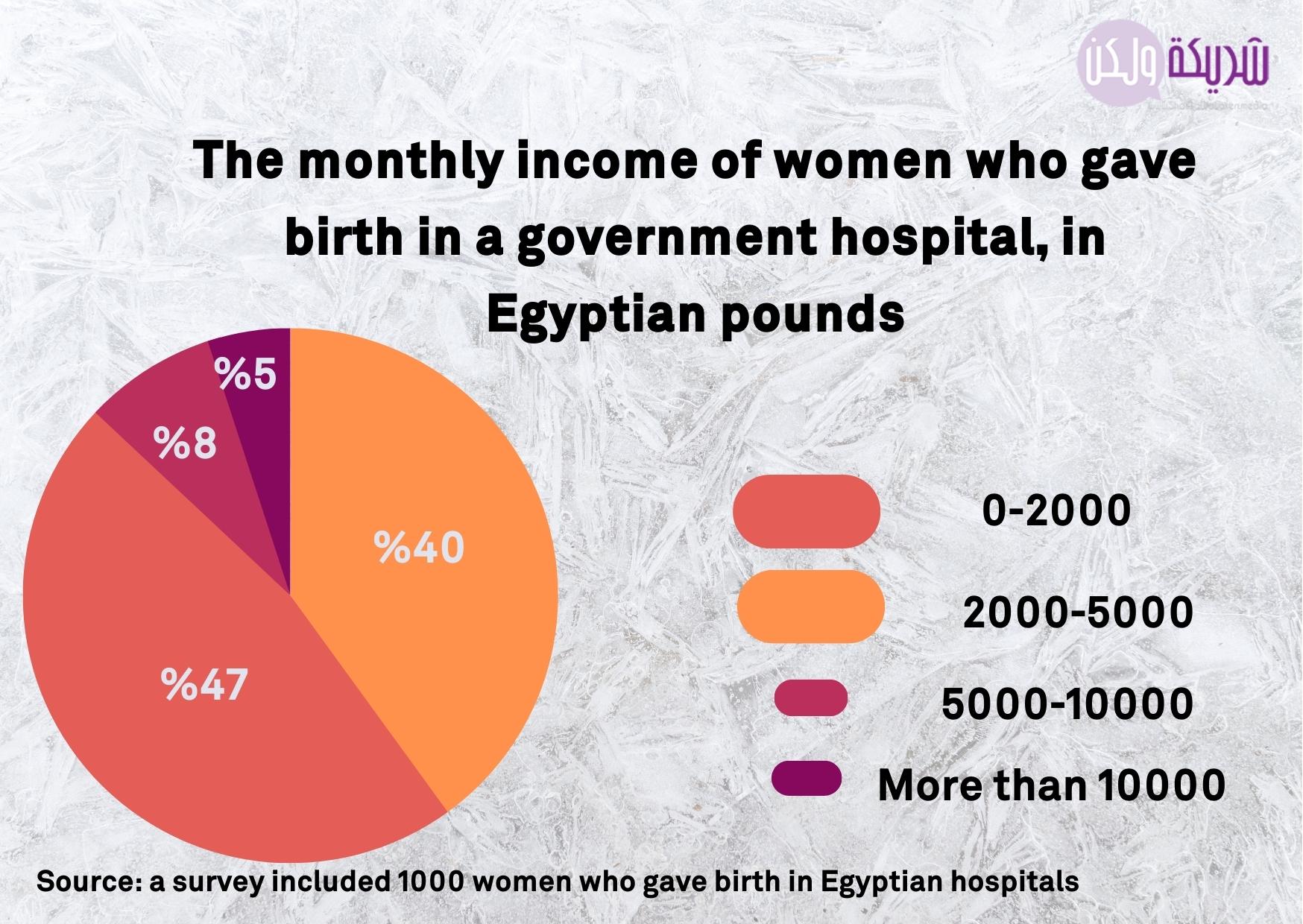
“As if I were her slave. I remember her well, and I will not forgive her.” This is how Wafaa remembered the doctor, whom she had asked about her health condition and expressed her concerns about the continuation and abundance of her bleeding. And the doctor’s response was insulting and cursing her.
She was terrified of the bleeding, and asked everyone who examined her about her condition. They had only one answer; the fetus’s condition and the regularity of its pulse were the focus of their interest, while her bleeding and pain weren’t.
When she asked about her condition again, she was either ignored or scolded.
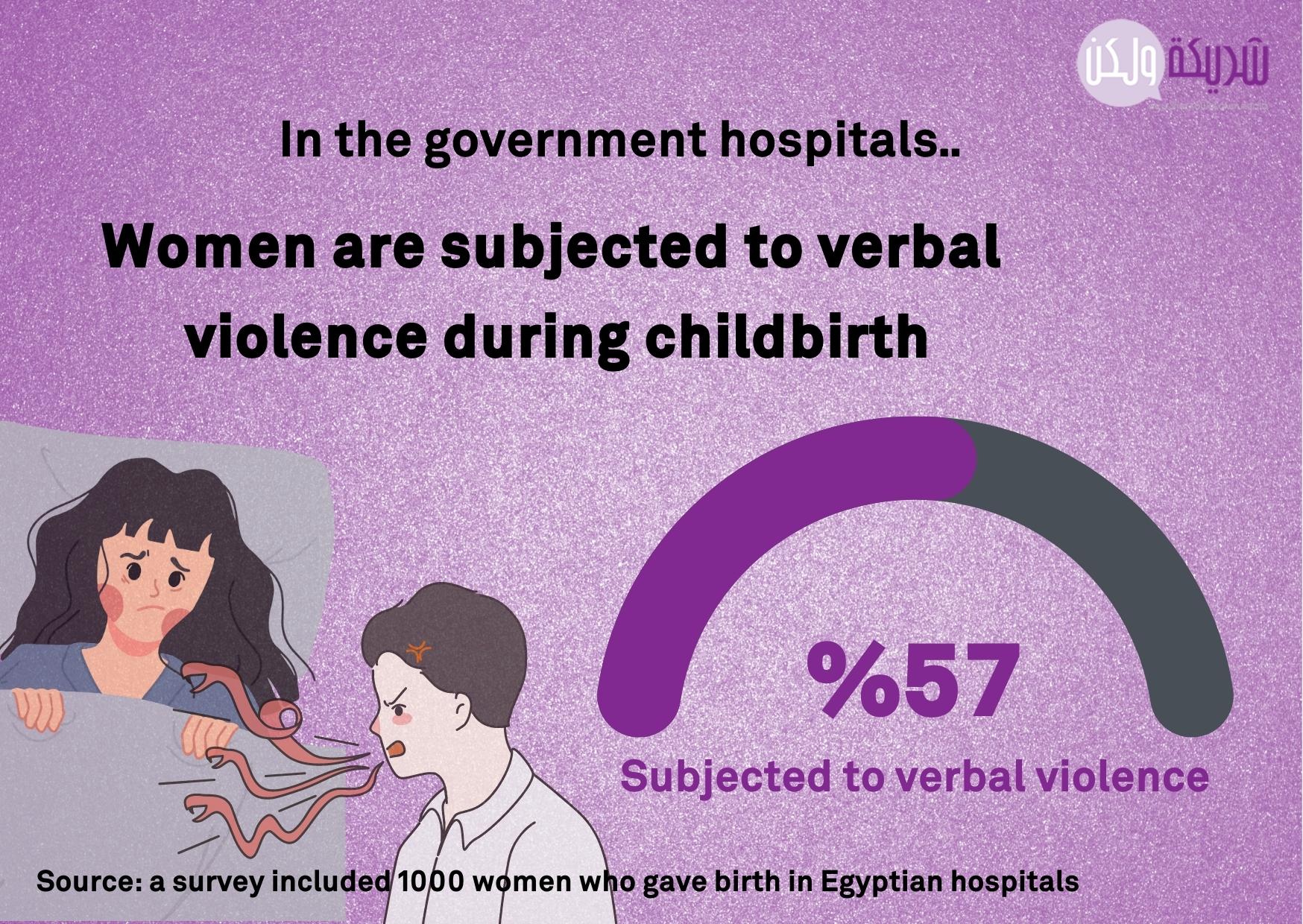
The World Health Organization confirmed that among the serious violations of women’s rights that occur during childbirth are their exposure to beatings and humiliation, and their separation from the newborn. They also face ridicule for their choices, and being forced to endure treatments and procedures they do not want.
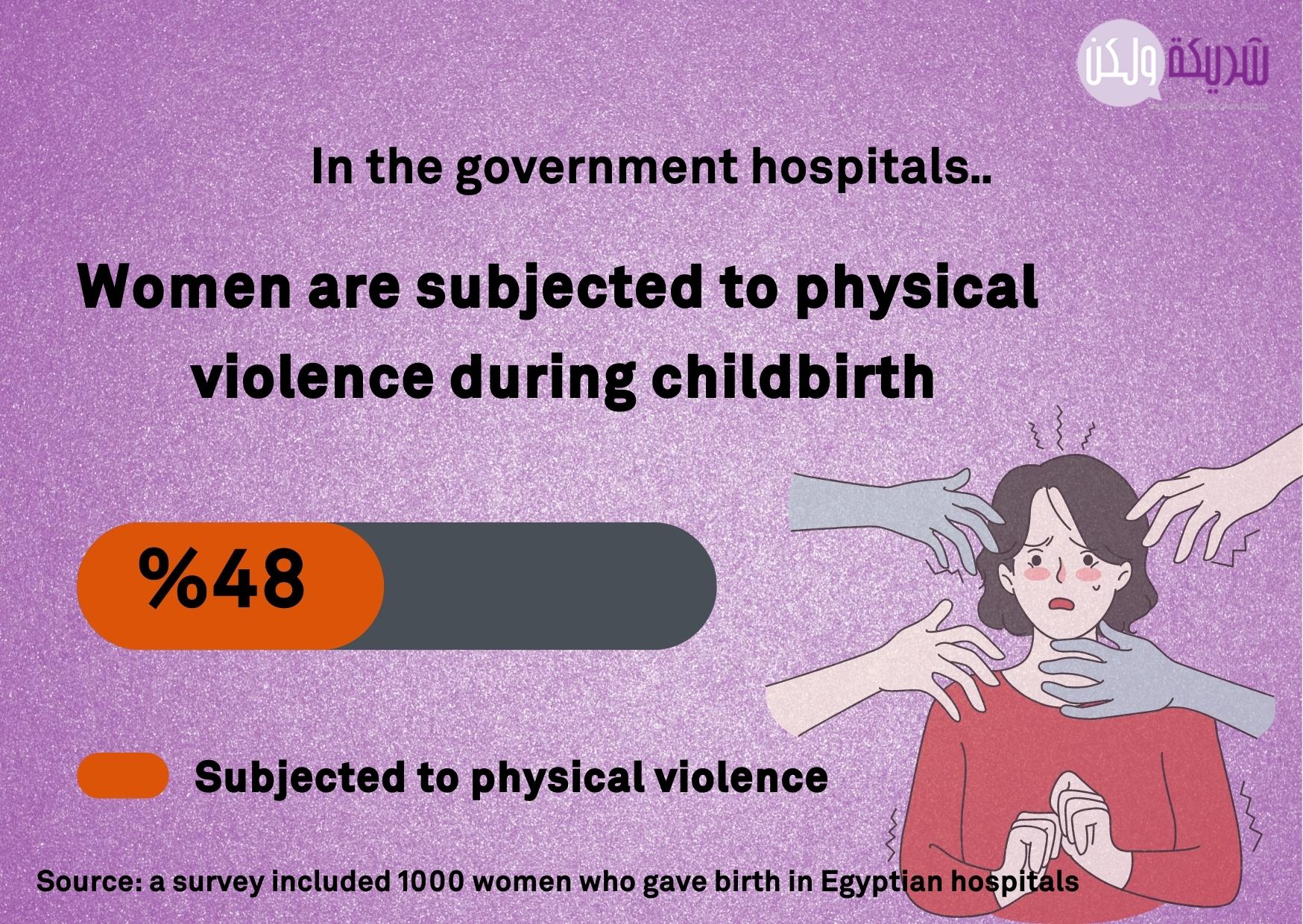
Wafaa was examined by 3 groups of students. Each group referred her to the next to study her condition, and she was not asked for permission before studying her, or subjecting her to repeated vaginal examinations.
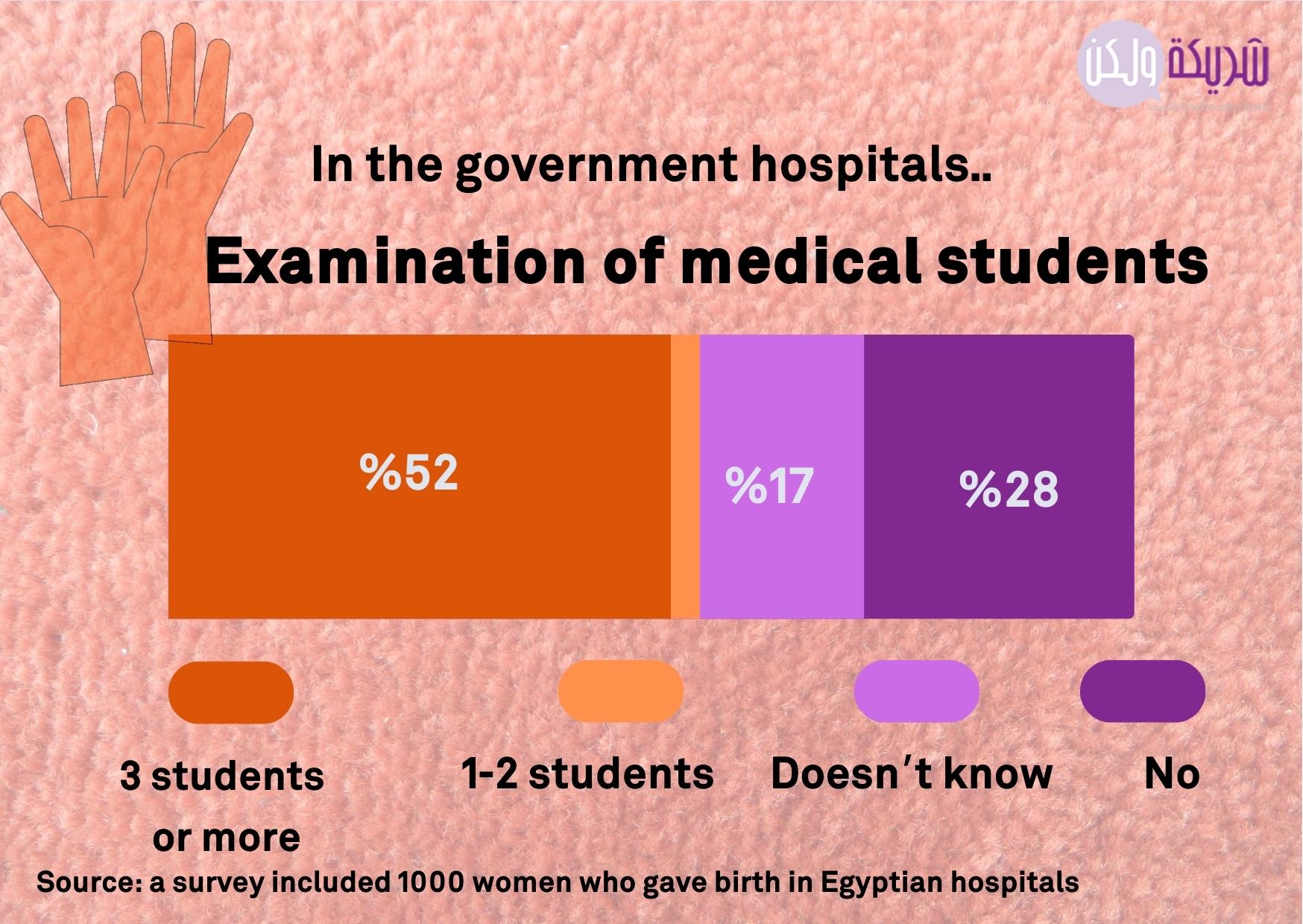
Dubravka Simonovic’s report indicated that some health service providers were acting without respecting privacy and confidentiality when conducting vaginal examinations during labor. They were conducted in front of other parties.
Medical students are also allowed to watch and examine a woman during childbirth, and to share her health information with others.
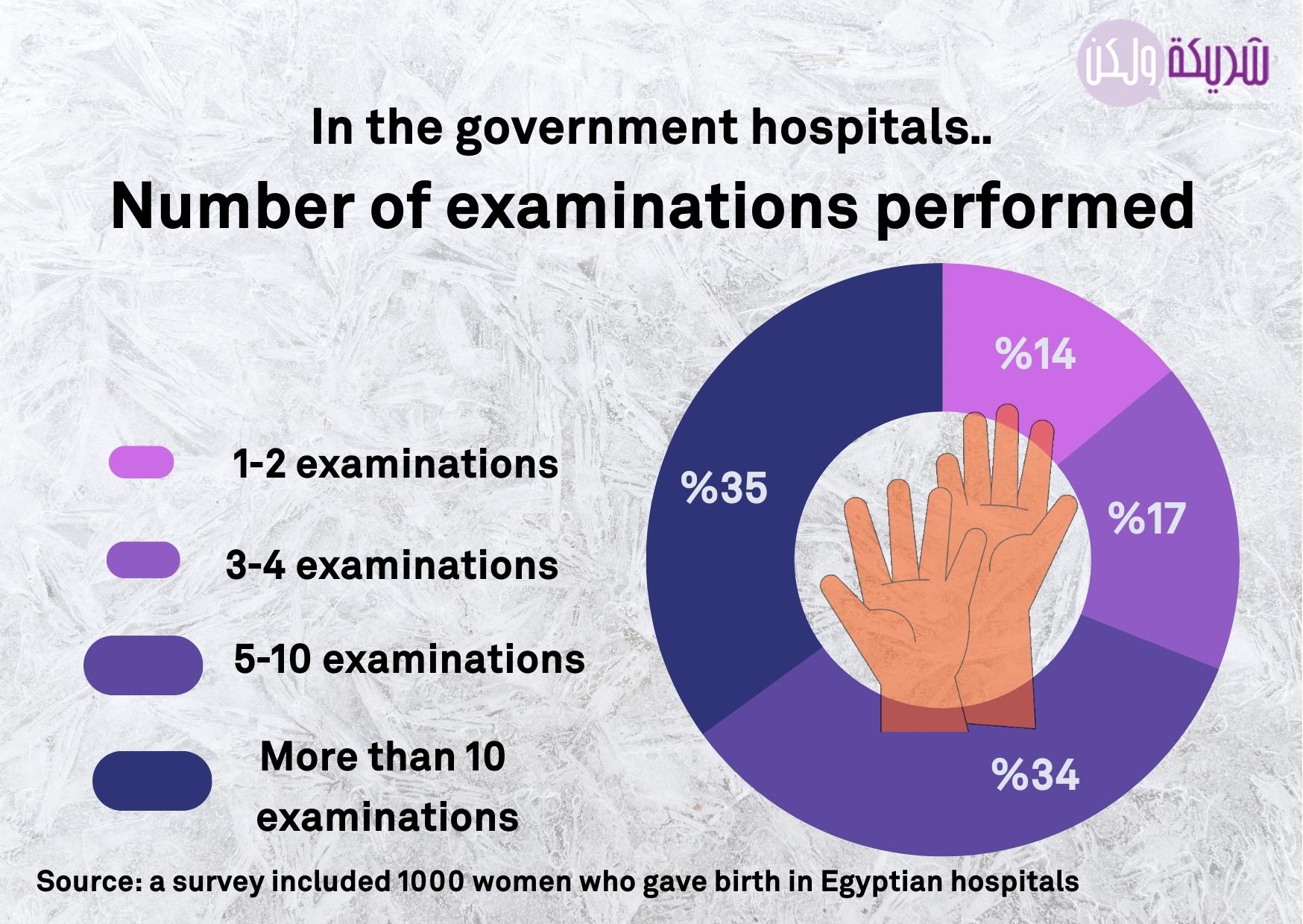
On the day of Wafaa’s childbirth, the doctor treated her roughly and didn’t care about her complaints, and refused to deliver her. But, he changed his mind and agreed, after a recommendation Wafaa obtained from a colleague, but it was not sufficient to obtain optimal care.
She later developed puerperal fever, a common obstetric complication, and had one of her stitches from the cesarean section pop open.
At that time, Wafaa begged for help from the hospital staff, since she was denied, as Nashwa was, the presence of a companion since she was submitted to the hospital.
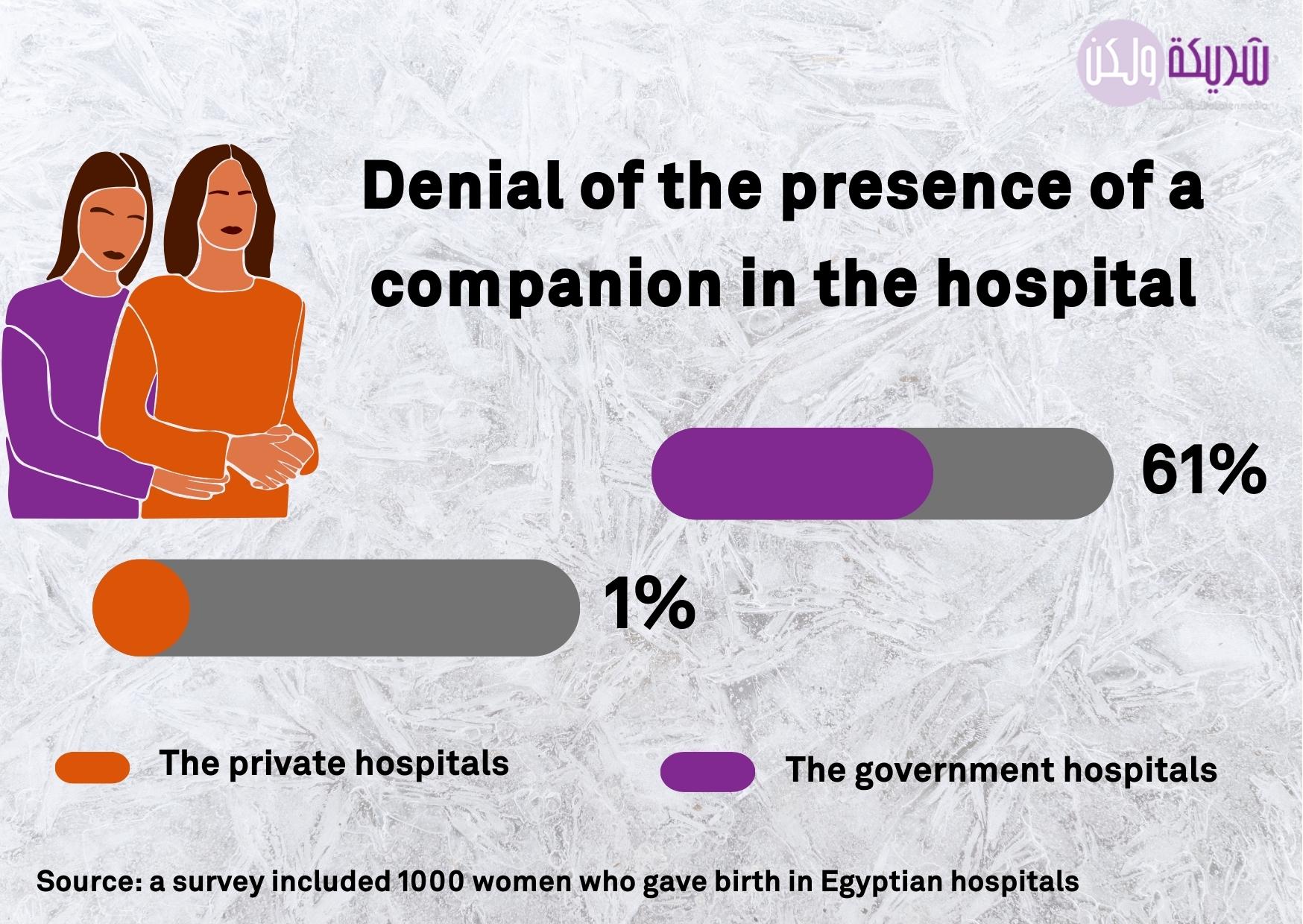
Her temperature rose, and no one responded to her request to see a doctor, or to provide her with an antipyretic and pain reliever.
In her interview with our platform, she confirmed that she called her husband and asked him to take her away from the hospital.
She added, “I felt like I was dying. So, I left the hospital at my husband’s responsibility, and I had to go to a private hospital to treat the physical complications I suffered from.” But, she confirmed that she “doesn’t know when she will get rid of her psychological suffering.”
Female gynecologist: There isn’t adequate supervision
Yasmine Abou El Azem, a gynecologist, said, “doctors take a course during their undergraduate studies dealing with patients’ rights and privacy. But the problem is always in the practical application, as the doctor’s ethics are the only control over whether or not he adheres to the profession’s ethics in the absence of adequate supervision.”
She explained the importance of a vaginal examination during a natural childbirth to follow-up on the progress of the childbirth, and to ensure that there are no complications that require intervention by cesarean section.
At the same time, she indicated “the need to respect women’s rights and inform them of the purpose of the examination, how to conduct it, and its frequency based on the stage of childbirth, and they have the right to refuse. On the other hand, the doctor has the right to refuse to follow-up with her.”
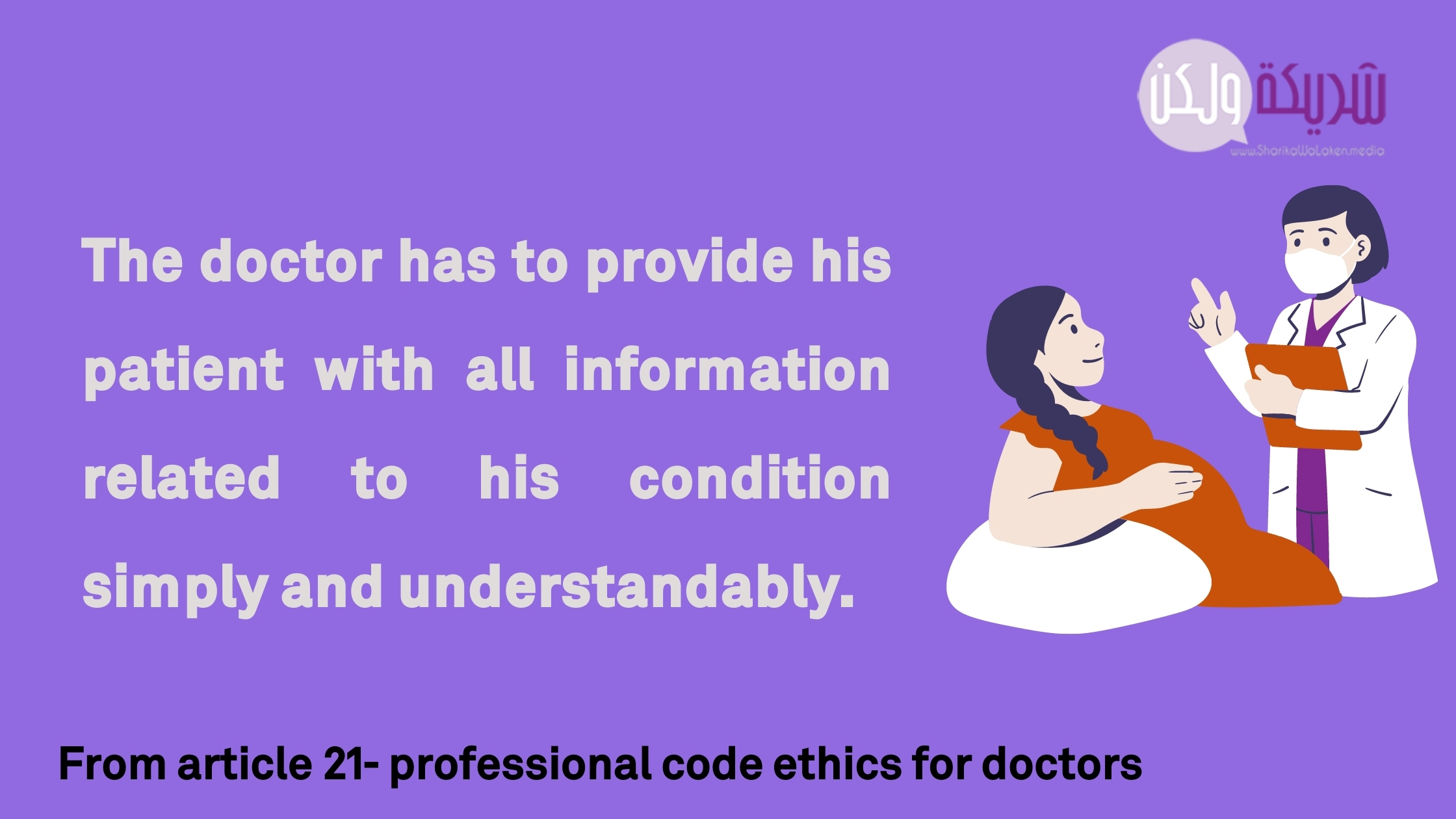
Yasmine also pointed out that “the multiple examinations and those in charge of them, and of performing them in government and teaching hospitals, is related to the doctor’s conduct of the examination to assess the condition. And then he would ask a student or a doctor whose at the beginning of their professional life to re-assess the condition to learn.”
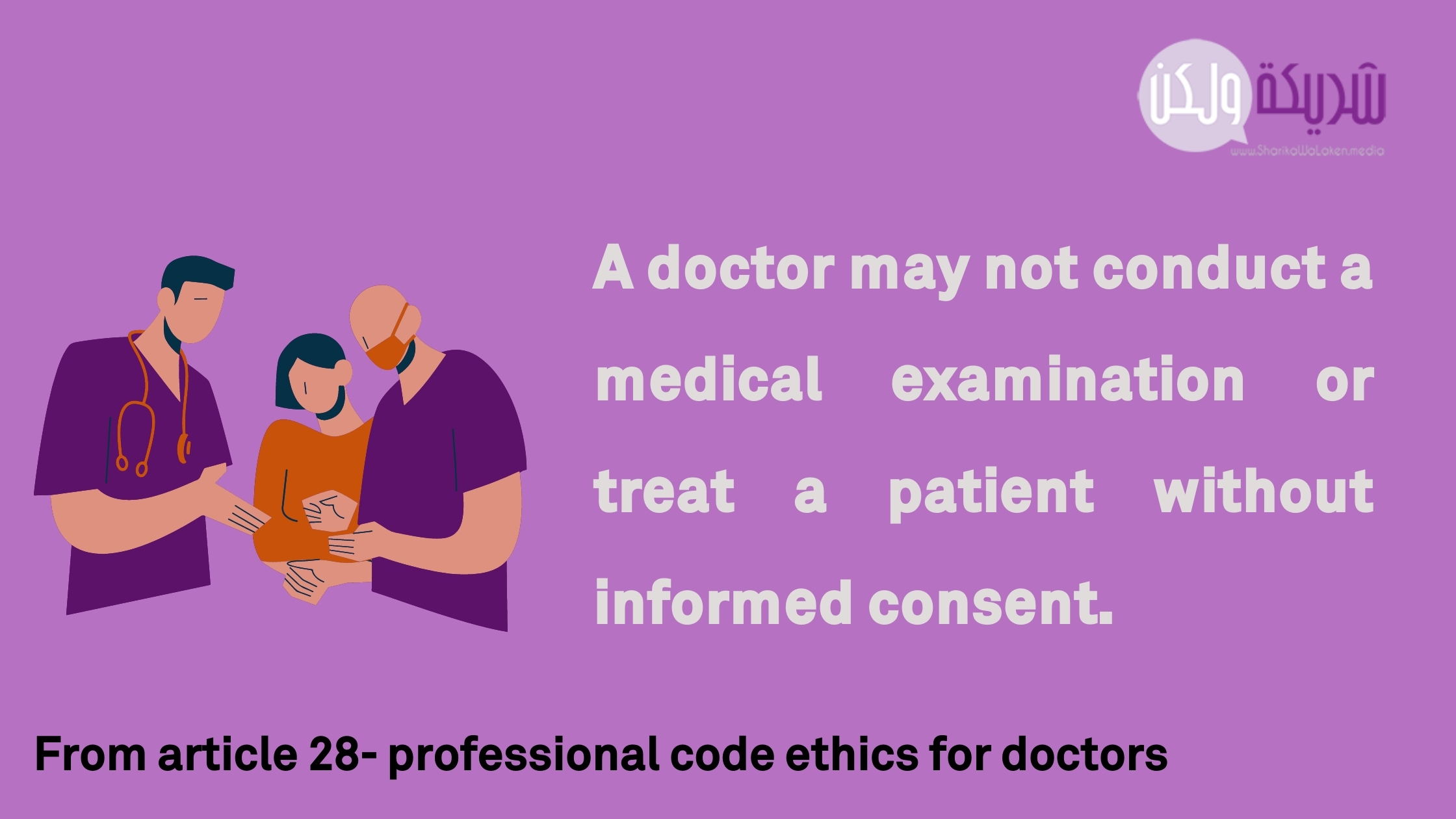
Yasmine talked about natural childbirth, confirming that it is more painful for women who give birth in the government sector. While the private sector can provide pain reduction methods.
She also considered that the lack of painkillers should not be blamed on the doctor because it is related to the health system.
As for the episiotomy, she said, “some doctors perform it with boundaries, and only in case a woman needs it, but others perform it routinely.”
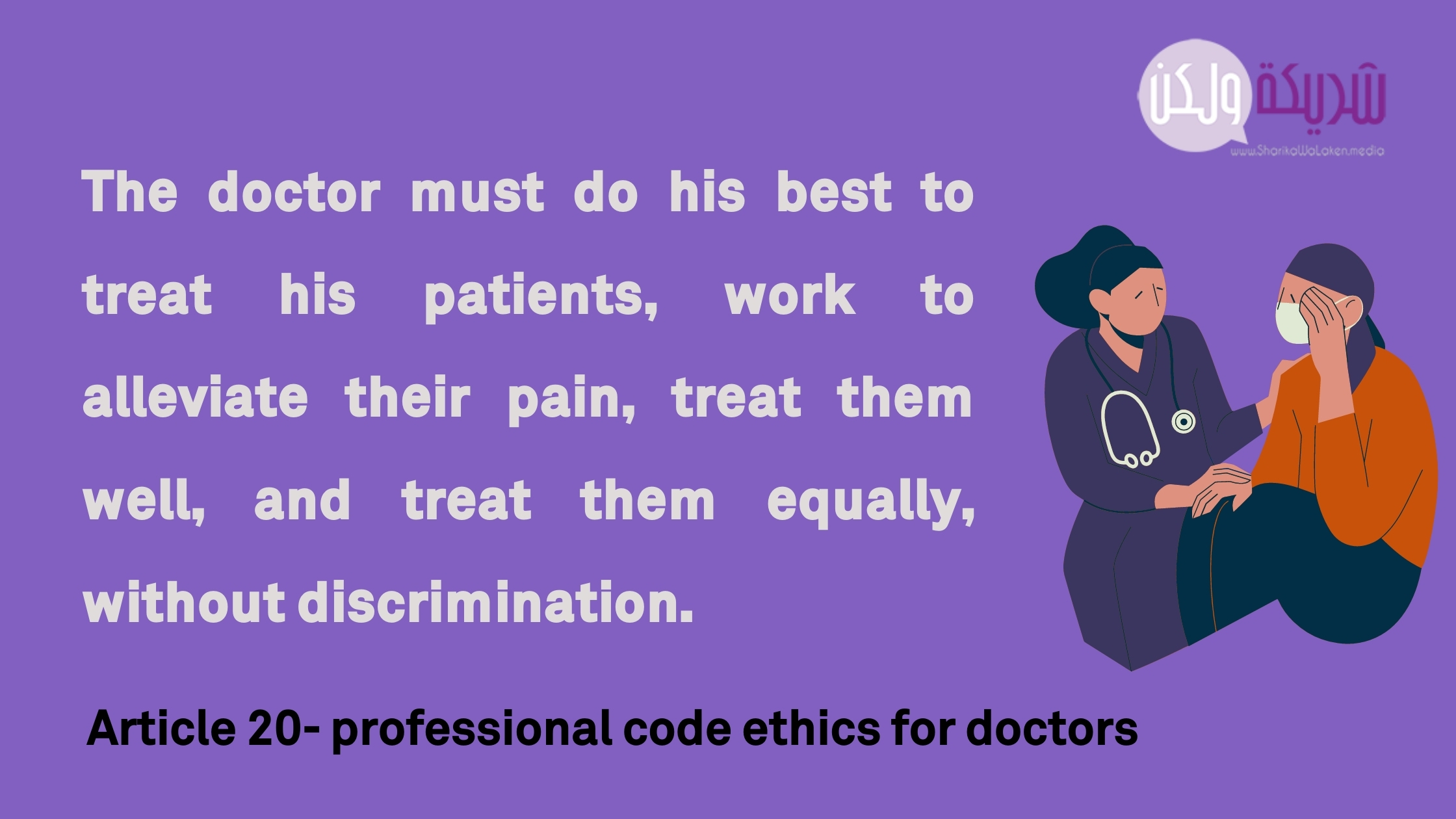
Is there a solution?
In her conversation with our platform, Intisar Al-Saeed called for the issuance of legal legislation criminalizing obstetric violence in its various forms, activating the professional code of ethics for doctors, paying attention to training medical staff to respect the rights of women during childbirth, and encouraging those who were subjected to obstetric violence to file formal complaints.
A study by the Population Council, in which the Ministry of Health participated, recommended that the government medical sector improve the quality of its services, especially those related to counseling, communication with women, and provision of adequate care and pain management. And to work on attracting more women from low socio-economic groups, for whom and their families to resort to the private sector in pursuit of quality service imposes a financial burden, and exposes them to unnecessary risks of cesarean section.
While Yasmine Abou El Azem considered that “the high rates of obstetric violence in government hospitals compared to the private sector, is due to the lack of capabilities in the government sector.”
She added, “providing methods to reduce pain, educate, and raise awareness will make a big difference in the quality of service provided to women, and their acceptance of doctors and the procedures that take place during childbirth.”
While Intisar Al-Saeed indicated that many medical staff in government hospitals work in difficult conditions, long working hours, and limited capabilities. But, she emphasized that “women should not bear that bill, and doctors should work with the Ministry of Health to solve their problems, away from women’s bodies and rights.”
The reporter tried to contact the spokesperson for the Egyptian Ministry of Health, Dr. Hossam Abdel Ghaffar, several times, without receiving any response.
Today, Nashwa embraces her child whenever she remembers those cold rooms with open doors, where hands and sharp surgical instruments waded into her body without anesthesia or mercy.
Likewise, Aya combats the horrific loss of her first child with a long, grateful look at her three young children.
As for Wafaa, she contacts others who have gone through the same experience to support each other psychologically, and she is waiting for the day when those who insulted her will be held accountable.

Written by: Sarah Gamal
Supervised by: Dr. Ruba Al-Helo

